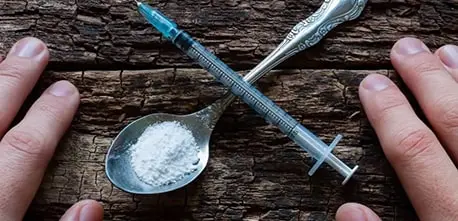Heroin Addiction
What is Heroin?
Heroin is a highly addictive, fast-acting opiate, made from the opium poppy, Papaver Somniferum. In powder form, it appears as a powdery white-to-sticky dark brown powder. From its powder form, a user might place the powder on foil and heat it from underneath, inhaling the resulting fumes using a small, narrow tube. Alternatively, a user might mix the powder with citric acid and water, heat it, filter it, and then inject it via a syringe.
Though it is prescribed in the UK as a strong pain medication, it is most commonly used as a recreational drug for the euphoric effects it produces. The euphoric effects of heroin are so strong that users will often build tolerance and become addicted very quickly. Once addicted, a user will often seek out more of the drug by any means possible.

Short-Term Effects of Heroin Use
Heroin has many short-term effects, including euphoria, alternating between an alert and drowsy state, mouth dryness, warm flushing of the skin, reduced sensation of pain, slowed breathing, and muscular weakness. In addition to these effects, heroin can produce a number of unexpected side effects, including nausea, dry mouth, itchy skin, constricted pupils, light sensitivity, decreased body temperature, and bluish hands, feet, lips, etc.
Long-Term Effects of Heroin Use
With heroin use also come several negative long-term effects. Users may develop an infection of the heart lining and valves, abscesses, cellulitis, liver disease, decreased kidney function, or a variety of pulmonary complications. A user’s veins may also become damaged or collapse as a result of frequent injection. Of course, there is also always the risk of overdose or contracting blood-borne pathogens and hepatitis via the sharing of needles.
Heroin Addiction
Physical Effects of Heroin Abuse
It can also slow down your circulatory and respiratory systems, which means you may have trouble breathing and experience an irregular heartbeat. Because it messes with your blood flow and breathing, overdoses on heroin are incredibly common.
Mental Effects of Heroin Abuse
Heroin Dependency
However, continued heroin abuse also makes stunts the brain’s ability to produce dopamine on its own, which means that a sense of despair begins to set in, whenever a person goes a period of time without using heroin. This is one major reason why heroin is so hard to quit using, and it’s a reason that many people who suffer from heroin withdrawals will attempt to commit suicide.
If you or someone you know struggles with dependency to heroin, please don’t hesitate to call and get help, today.
What are the Common Signs of Heroin Use?
Sometimes it can be difficult to tell whether a loved one is using heroin. Learning some of the most common signs of heroin use can help you better identify when there might be a problem. Here are some of the most common signs of heroin use you might see in a loved one who is using:
- Dramatic changes in sleeping patterns
- Significant weight loss
- Pale and gaunt appearance
- Decline in personal hygiene
- Decrease in appetite
- Frequent isolation, especially away from others who don’t use
- Lack of money
- Legal trouble
- Household items sold to pay for more of the drug
- Foil being used up very quickly
- Paraphernalia, such as lighters, spoons, syringes, shoelaces, or glass pipes
How Much of a Problem is Heroin Use?
Heroin use has a history in the United States that dates back to 1874. In the past ten years, in particular, heroin use has risen exponentially. According to a 2013 report released by the CDC, heroin-related overdose deaths nearly quadrupled between 2002 and 2013, and use of the drug increased by 63% over that time period. Prescription pain medications also seem to be a major gateway drug for heroin, as an estimated 80% of heroin users started by taking pain pills.
Here in Utah, public officials are noticing the major rise in heroin use as well. In December 2015, U.S. attorney for Utah John Hubur, along with Salt Lake City law officers, declared that Utah was in the early stages of a “tsunami” of cheap heroin, which had already resulted in a sharp increase in robberies and bank holdups. The coalition of federal and local law officers urged families, agencies, and services to increase addiction treatment. Last year, law officers in Utah seized 244 pounds of heroin, while in 2010 that number was just 46 pounds. Utah currently ranks fifth in the country for the highest drug overdose deaths, and an average of 21 Utah residents die each month as a result of prescription pain medications.
How Do You Stop Using Heroin?
With the right help and the right treatment approach, it is possible to stop using heroin. Most heroin addicts at some point try to quit cold turkey, and some do manage to quit this way. It’s highly important to remember, however, that quitting any drug cold turkey without the assistance of medication—especially heroin—brings about severe withdrawal symptoms, and the psychological symptoms can become so strong that the user will consider suicide. Moreover, when cravings and withdrawal symptoms become too difficult to manage, a user might revert to using—only the dosage they are used to taking is too high for their body to handle. This results in overdose and possibly even death.
If you are a heroin user, you should know that treatment is available. Here at Renaissance Ranch, our professionals are prepared to help you through detox, diagnose any coexisting mental health issues, and arm you with a comprehensive set of much-needed tools for your recovery.
